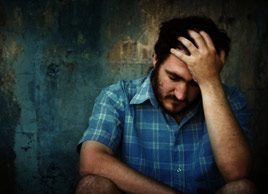Depression in men: Symptoms and treatment
Depression is debilitating, and can often go undiagnosed in men. Here’s how to spot it and how to help

Source: Best Health Magazine, March/April 2009
All too often, men fail to recognize the symptoms of depression and to get the treatment they need. ‘Men tend not to ask for help,’ says Tod Augusta-Scott, coordinator of Bridges, an institute in Truro, N.S., that offers domestic-violence counselling. ‘There are social expectations of men. They’re supposed to handle things themselves.’
Though stats show men comprise one-third of Canadians suffering from major depression each year and women comprise two-thirds, there is evidence the gender gap may be much narrower. For example, a high incidence of suicide (each year, almost 3,000 of the 4,000 Canadians who kill themselves are men) could be masking untreated depression.
The condition can go unrecognized because, unlike women, men often don’t show the textbook signs. Zindel Segal, a psychologist at the Centre for Addiction and Mental Health in Toronto, says that because of how women are socialized, we’re more comfortable talking about our emotions and seeking help. Men are more apt to be irritable and angry’moods that aren’t assessed in classic diagnostic tests. Augusta-Scott says many of the men he has treated ‘act out’ to avoid confronting their depression and painful feelings of shame or guilt. ‘Initially, they come in with ‘I don’t know why I do it,”’ he says. So, Augusta-Scott asks male patients pointed questions, like ‘Does it take more guts to face your fears and share them, or to run and hide from them?’
Undiagnosed men often turn to substance abuse to cope. They abuse alcohol and drugs at nearly three times the rate of women. ‘Often, people are smoking pot and drinking to self-medicate for anxiety and depression,’ says Augusta-Scott. ‘If they were in the medical system, they could be diagnosed and put on medication.’ Like the suicide rate, the high substance-abuse rate among men might be masking much higher rates of depression. (Indeed, in studies of two communities that prohibit alcohol or have very low rates of its use’the Amish and Orthodox Jews’researchers found that male and female rates of depression are the same.)
If you think your partner or a loved one may be depressed, ‘just ask him: ‘Do you think you might be depressed?”’ says Peter J. Bieling, a McMaster University psychologist and co-author of Ending the Depression Cycle. Gently describe to him specific examples of the behaviour that worries you. If he agrees he may need help, ask him to talk to his family doctor for a referral.
With files from Susan Freinkel
This article was originally titled "Depression in Men" in the March/April 2009 of Best Health. Subscribe to Best Health today and never miss an issue!




